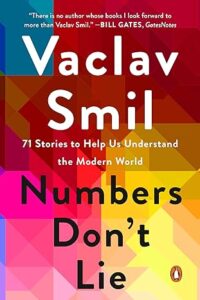Believe it or not, there are people who tell the truth. Like Vaclav Smil. All he sells are the facts.
Background
Born in 1943 in what is now the Czech Republic, Vaclav Smil spent his early adulthood nourishing his neurons at Charles University in Prague. In 1969, after a Soviet invasion, he ditched his homeland for central Pennsylvania, earning a PhD in geography from the College of Earth and Mineral Sciences at Penn State University. From there, he landed a gig north of the border at the University of Manitoba in Winnipeg (Canada), where he chose to stick around for a while. He’s now a Distinguished Professor Emeritus despite having rarely made an appearance at faculty meetings. A mind like this, needless to say, couldn’t be corrupted by the empty wind of a boardroom.
Arrogant? Perhaps.
Blunt? Yes.
Data-driven? Absolutely.
In fact, Smil has made a career of getting the facts straight. And mercifully, he hasn’t allowed himself to be siloed, instead taking an interdisciplinary approach by applying his numerical analysis to things like energy, food production, the environment, materials and manufacturing, population trends, and economic development. In short, he’s attacked major global challenges, along the way publishing over 40 books and attracting a fan base that includes Bill Gates. There is no author whose books I look forward to more than Vaclav Smil, once said the Microsoft co-founder.
The at-times reclusive Smil, who apparently has never owned a mobile phone, has delivered some quotable quotes himself:
I have never been wrong on these major energy and environmental issues because I have nothing to sell.
I really don’t think I have anything special to say. It’s out there if you want to know it.
What’s the point of setting goals which cannot be achieved? People call it aspirational. I call it delusional.
I used to live in the westernmost part of the evil empire…they forever turned me off any stupid politics…
You have to recognize the realities of the world, and the realities of the world tend to be unpleasant, discouraging, and depressing.
In recent years, the Czech-Canadian has received attention for Energy and Civilization: A History and How the World Really Works, but an introduction to Smil might be best captured by a work as diverse as his portfolio itself.
Numbers Don’t Lie
In a world full of storytellers, emotion reigns supreme. It is that emotion, after all, which sells. Smil, however, exhibits little patience for feelings and agendas.
In Numbers Don’t Lie: 71 Stories to Help Us Understand the Modern World, he sets out to describe our surroundings, not via personal anecdotes or futuristic rubbish, but with actual figures.
In his words, [this] is an eclectic book [that includes] the big topics I have pursued in my books since the 1970s.
Here are five paraphrased samples.
The Japanese diet
Japan, that of crowded commutes, long work days, tobacco, and hierarchical conformity, has the highest life expectancy in the world. With such exceptionality has come a hunt for the magic bullet—genetics, spirituality, even green tea. But perhaps the best answer lies in the food supply. While Western nations have a daily availability of 3,400 – 4,000 kilocalories per capita, Japan finds itself under 2,700, resulting in a daily mean intake under 1,900 kilocalories. In other words, the country is not eating itself to death.
The rise of data: Too much too fast
A few millennia ago, data was stored only in the human brain. With the rise of external storage, first in print and then in servers, data creation has taken off to the tune of 1.7 megabytes of data generation per second per person (in a world of eight billion people). Unfortunately, accumulated data does not equal useful information. (Just ask any doctor using an electronic medical record.)
Why manufacturing remains important
In some intellectual circles, it’s trendy to highlight the decline of manufacturing. Yet no other sector generates as many well-paying jobs. As an example, in 2019, despite Facebook having a market capitalization almost three times that of Toyota, the auto manufacturer employed nearly nine times as many people. It’s not surprising, then, that countries in which manufacturing is a large percentage of GDP have low unemployment. It also follows that in 2018, the top four economies in the world—the US, China, Japan, and Germany—accounted for about 60 percent of the world’s manufacturing output.
Why you need fossil fuels to get electricity from wind
Wind turbines are arguably the most visible symbols of the quest for renewable electricity generation. But behind the modern façade lies the old-school production of cement, plastics, and steel. To make the steel required for wind turbines that might operate by 2030, you’d need fossil fuels equivalent to more than 600 million tons of coal. The point is not to stop but rather to temper expectations, i.e. set realistic carbon-related goals (see quote above).
Planet of the cows
Leaving aside microorganisms and small insects, global biomass is dominated by two entities. Humans, yes, as the almost eight billion people amount to something like 390 million metric tons. But in first place are cattle, whose membership of approximately 1.5 billion equates to 600 million metric tons. Is that natural?
The book, of course, comes with 66 additional (non-paraphrased) insights.
So the next time you’re contemplating spewing nonsense—particularly around impressionable minds—consult Vaclav Smil first.

2 Responses
the devil is in detail.
There are facts and then there is interpretation of facts.
Very true! And when the interpretation is backed by dollars, all bets are off.